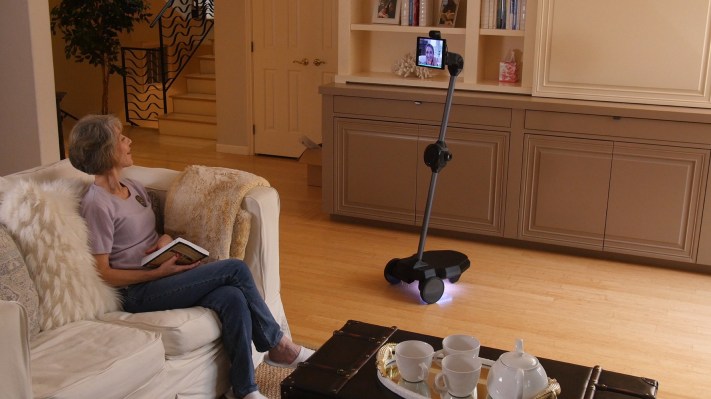Home robotics is an area of intense interest, with many large companies exploring how they might best address the potential market. Bosch subsidiary Mayfield Robotics has Kuri, and automakers including Toyota and Honda have their own approach, which a focus on independence for people continuing into our senior years. Startup OhmniLabs thinks that human connection is what will convince people to bring robots into their home, and their first robot, Ohmni, is built with bringing people together in mind.
The Ohmni is a home robot that might look familiar if you’ve ever been in a meeting room or attended a conference where there was also a telepresence robot present. It’s basically a display with a built-in camera sitting atop a tall shaft, with a base that includes a flat platform and wheels for getting around. Those are powered by brushless motors, which OhmniLabs says will result in very quite operation, and the whole thing folds down for easy carry-on capabilities, weighing just 20 lbs in total so that most people can easily pick it up should they need to do so.
Ohmni is also designed around ease-of-use: The whole point of the project is to seamlessly bring together families and friends separated by large distances, so OmniLabs focused a lot of effort on making it usable out of the box, without any complicated computer-based setup required. In fact, you can even have Wi-Fi network credentials pre-installed so it’ll connect out of the box, something the OhmniLab team can pre-program without a human ever seeing your SSID name and login.
The robot itself is also 100 percent remote-controlled, and has autodocking functionality for finding its charging station and plugging in when it’s running low. The display head of Ohmni also tilts, giving you a floor-to-ceiling, and more natural interaction options.
OhmniLabs co-founders Jared Go and Thuc Vu came up with the idea for Ohmni after realizing that telepresence in structured, office environments might be a neat trick and novelty, but its real potential resided at home, where the unstructured environment meant that a robot that could replicate the experience of dropping in on, or even living with a close relative would be a much more engaging experience over time.
Vu, who studied AI and robotics at Carnegie Mellon and Stanford, previously founded two companies, one of which sold to Google. Go also attended both CMU and Stanford, and has expertise in network reliability algorithms, as well as mechanical and electrical engineering and industrial design. But both wanted to create something that would change people’s daily lives, hence the founding of OhmniLabs.
[gallery ids="1475922,1475921,1475933,1475932,1475931,1475930,1475928,1475927,1475926,1475925,1475924"]
“When we started the company, we wanted to do something with robots that could help people,” Go explained in an interview. “A lot of companies are already focused on automation, manufacturing, saving costs, and probably reducing the number of jobs, but we believe you need to counterbalance that with robots that improve quality of life.”
Already, Ohmni has done not only that, but actually saved a life in one instance. Vu told me about how during their preliminary testing, one user in San Diego had Ohmni in his mother’s house. During a business trip, he called his mother, a Mexican immigrant with no English language skill, and was worried when she didn’t answer. He activated Ohmni and found her in bed, nearly unresponsive due to what turned out to be a bad urinary track infection. He was able to call both 911 and his brother while staying in touch with her via the robot and they managed to get her to a hospital where she was treated.
Aging populations, and the issue of how to address changing modes of family life that can see members more distantly separated, have led many companies to explore how robots could help with continued independence and quality of life. Ohmni might be one answer that’s available now, without any significant advances needed in basic technology.
Ohmni is available during a pre-order campaign via Indiegogo, with the first shipments starting in just four months. The robots costs $1,395, with a range of color and material options made possible because each is built in OhmniLabs’ own Santa Clara workshop. Final retail pricing is expected to be around $1,895 once the campaign concludes.
